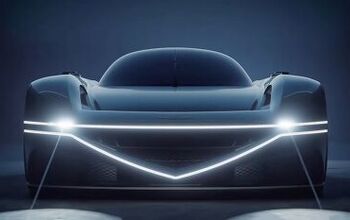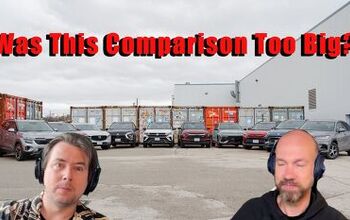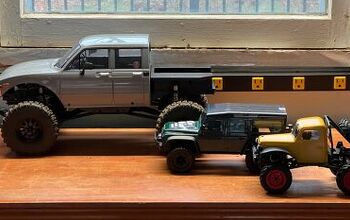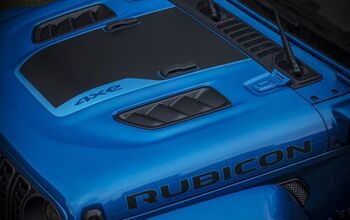Top 10 Best Fuel Filters to Keep Your Ride's System Clean
Your vehicle’s engine relies on a stream of fuel getting pumped from the tank to the carb or injectors to keep it running. If there’s a problem with that flow, anywhere in the system, bad things start to happen quickly. Low flow can damage your fuel pump, particles can clog your injectors making the car run poorly, it can even cause your engine to run lean and end up with permanent damage.
That’s why keeping your fuel system clean is essential to the health of your vehicle. An unclogged system can mean more power, better fuel economy, and better engine longevity. Plus it’ll drive better in every situation. It’s why changing your fuel filter is more important than ever before. Especially with high-pressure direct injection, where even the smallest bits of debris can clog an injector or pump and cost you thousands. So here are some of the best fuel filters for all types of engines, to quench that thirst for gasoline (or diesel).
Table of contents
- 1. Editor's Pick: ACDelco Professional Fuel Filter
- 2. Motorcraft Fuel Filter
- 3. AutoBbox AN Fuel Filter
- 4. Mahle Original Fuel Filter
- 5. Dorman HELP! Glass Filter
- 6. K&N Fuel Filter
- 7. Toyota Genuine Fuel Filter
- 8. Aeromotive Inline Filter
- 9. Mopar Fuel Filter/Water Separator
- 10. Ecogard Fuel Filter
- How to Pick a Fuel Filter
- When and Why to Change Your Filter
- How to Change Your Fuel Filter
- {"attachment_id":"832870"}
1. Editor's Pick: ACDelco Professional Fuel Filter
When it comes to how your vehicle works, the people who know it best are the engineers who designed it. That's why, when it comes to filters, a brand like ACDelco (which is the in-house parts company for General Motors) is a top choice. This is the filter your GM dealer uses, and the one that GM trusts to make sure your vehicle stays running through your warranty and beyond.
Designed to be an OEM replacement part, you should expect proper fit, form, and function from this recommendation. It'll protect your vehicle's fuel system from contaminants such as dirt, rust, and paint particles by trapping them before they enter the fuel delivery system. The result is improved and safe engine performance.
Pros | OEM quality, comes with o-rings |
Cons | More expensive than other brands |
2. Motorcraft Fuel Filter
Another original equipment brand, this time from Ford. Motorcraft filters are tested beyond what most aftermarket offerings would ever think of. This inline filter can capture 98 percent of particles 8 microns or larger, keeping your injectors and high-pressure pump clean. That extra-fine filtration should make your fuel even cleaner than the air you're breathing. The filters are ethanol fuel safe and are made with stainless steel casings for corrosion resistance under your hood.
The thorough testing process includes tests under extreme temperatures (-40ºF to 250ºF), leak resistance under extreme pressure, corrosion resistance, flow restriction resistance, and more. As a result, this fuel filter meets strict Ford original equipment quality, performance, and durability standards including key life testing to the equivalent of 10 years or 150,000 miles for passengers cars and light trucks.
Pros | Extensive durability testing |
Cons | Doesn't come with new clips, old ones often break |
3. AutoBbox AN Fuel Filter
Over time, your factory fuel lines can become corroded, and your replacement lines may not quite match the original equipment ones. Or maybe you've installed a new engine and need some filtration that was never there in the first place. This universal filter lets you install it nearly anywhere thanks to the inclusion of three common AN-fitting sizes. The filter has a 100-micron element, and it's cleanable to let you reuse it over and over again. Protect your engine with this universal fuel filter.
The body on this replacement fuel filter is machined from lightweight 6061-T6 billet aluminum before receiving a black anodized finish. It includes 6 AN, 8 AN, and 10 AN fitting adapters, along with o-rings for proper sealing in high pressure applications.
Pros | Install nearly anywhere |
Cons | Filters down to just 100 microns |
4. Mahle Original Fuel Filter
Mahle filters are used by many European auto manufacturers, including BMW. They're designed to meet the high standards set by German carmakers, able to hold plenty of debris while maintaining enough fuel pressure to keep your car running strongly. Fuel pressure regulation and recirculation work together to supply the right amount of fuel for your vehicle, even BMW's V12s.
This recommendation features a superior embossed and pleated filter media designed for high dirt holding capacity and low pressure drop. It'll do a proper job at protecting your fuel system from dirt particles and corrosion damage.
Pros | Designed to meet BMW specifications |
Cons | Limited offerings for domestic cars |
5. Dorman HELP! Glass Filter
If you're having trouble diagnosing fuel issues, or if you have a non-factory engine that you need to be able to keep a close eye on, this glass fuel filter could be just the ticket. Thanks to the see-through design, you can actually watch as the fuel flows through. So if there's no pressure, or poor flow, you'll spot it right away. Same goes for fuel contamination like water.
Designed to protect your engine from possible damage, this fuel filter features high-quality construction for a prolonged service life. This company is well known for providing aftermarket parts to the auto industry, ranging from replacement parts to fasteners, and has a team of engineers and quality control specialists in the U.S.
Pros | See-through for easy inspection |
Cons | Small filter size |
6. K&N Fuel Filter
K&N is best known for its reusable air filters, but the company makes fuel filters as well. No, this one's not reusable, but it does offer many of the same benefits. Like high-performance filtration and a large capacity that lets it flow plenty of gasoline. There's a rolled seam that exceeds OEM fuel pressure requirements and a corrosion-resistant carbon steel filter housing.
The high performance cellulose glass filter media provides excellent protection for your fuel system by trapping contaminants and foreign materials. It's designed to fit directly into the stock location for an easy installation. K&N also includes replacement gaskets and clips were applicable.
Pros | High-performance filtration |
Cons | Some complaints of debris on threads |
7. Toyota Genuine Fuel Filter
Toyota's original-equipment filters are made by Denso, and since they're designed for Toyota engines they offer the best performance for those cars, trucks, and SUVs. This one offers factory levels of filtration, flow, and maintain proper pressure, giving you everything you need to keep your Toyota's fuel system running at its best. And since it is a genuine OEM product, you know it'll fit perfectly for your Toyota.
The fuel filter can also be used with other brands, but it's naturally designed for Toyota products. It's the ideal recommendation if you feel more comfortable with a genuine OEM part, rather than an offering from the aftermarket.
Pros | Factory equipment filter |
Cons | Some complaints of cracked housings |
8. Aeromotive Inline Filter
Aeromotive is best known for its high flow fuel pumps designed for high-performance engines, but the company also makes filters and assemblies to go along with its fuel pumps. Offering a wide range of filters with different inlet and outlet sizes as well as offering different levels of filtration, this particular model filters down to 10 microns using a replaceable cellulose filter element and can protect your performance engine's modified fuel system.
This option is capable of flowing 2,000 lb/hr with a pressure drop of less than 1 PSI. The filter assembly features an o-ring for positive sealing in high pressure applications and the housing is CNC machined from 6061-T6 aircraft aluminum.
Pros | Great way to add a filter to a new fuel system |
Cons | Doesn't include installation hardware |
9. Mopar Fuel Filter/Water Separator
From the official parts source of Fiat Chrysler vehicles, this fuel filter set is designed to hit original equipment specifications for filtration, flow, and longevity. Because this one's for a diesel it also includes a water separator, which makes it a convenient kit for your next change. In a diesel fuel system, water is almost as big of a danger as dirt, and just a small amount can ruin your expensive engine.
This specific listing is designed for the 2013-2018 RAM pickup truck equipped with a 6.7-liter Cummins Turbo Diesel engine. If you need a different application, make sure to do a quick search for your specific year, make, and model.
Pros | OE spec, comes with both filters |
Cons | Reviews suggest to be careful of some sellers |
10. Ecogard Fuel Filter
Ecogard says its filters are designed to meet new vehicle warranty requirements and offer the same precise fit as the factory component. This filter is designed for most GM trucks from 1985-2006 and has a multi-layer filter element that provides optimum filtering. The manufacturer claims ISO 16949 certification, a requirement that's designed to ensure quality management, responsibility, and record-keeping in the auto parts and components supply chain.
Featuring precise inlet and outlet connections for an easy installation, this recommendation protects your engine against damage by preventing foreign particles from reaching the fuel injector or carburetor. Make sure to do a search for the correct model if the listing below isn't applicable for your vehicle.
Pros | Lower price than dealer parts for extra value |
Cons | Some reviews suggest double-checking your vehicle fitment before ordering |
How to Pick a Fuel Filter
The obvious first step is to make sure you're choosing one that is designed to fit your vehicle and application. If it's a stock replacement, that usually means picking your vehicle in the website's virtual fitment garage or checking either the filter manufacturer's site or one of many common interchange guides.
If you're adding a filter to a vehicle that doesn't have one, or one with a modified engine or fuel system things become more complicated. The size of the lines running from the tank to the engine matter here, as to the type. Rubber and metal hoses use different end fittings, so do the common AN-style lines. You need the right ending and the right diameter, with the latter sized to help ensure your lines can move enough fuel to keep the engine fed.
If you're using a non-standard fuel, like diesel or E85, make sure your filter is designed to handle those products.
When and Why to Change Your Filter
Over time, fuel filters will clog with small particles, reducing flow and potential engine performance. A clogged filter can cause your engine to run poorly or fail to start. Forcing it to work harder can even kill your expensive fuel pump.
For a recommended change interval, check your owner's manual, which should let you know when the filter should be changed. If the manual doesn't say, many manufacturers recommend 30,000 mile or two-year (whichever is first) intervals. If you're operating a high-performance engine or driving in excessively dusty conditions, look at shortening that interval even more.
How to Change Your Fuel Filter
{"attachment_id":"832870"}
Photo credit: Travelerpix/ Shutterstock.com
Fuel systems can be under very high pressure, and gasoline and diesel fuel are both pollutants, so proper care when replacing, and proper disposal of old filters are essential.
To relieve fuel pressure, remove the fuel pump fuse and attempt to start the engine. This should remove line pressure, though the engine will likely not run. Find your filter, often located underneath near the middle of the car or truck, though occasionally under the hood. Especially on diesel pickups.
Remove the bracket for the old filter and then remove the lines leading to it. Fuel will spill, so catch it in a proper container for reuse or correct disposal. Check for an arrow on the existing filter, put the new one on with the arrow pointing the same direction.
Reattach lines, brackets, and any wires, then reconnect the fuel pump fuse and restart the engine. Because you've drained some of the fuel, this could take a bit longer than normal. Dispose of the old filter in compliance with your local environmental regulations.
Please note that fuel is highly flammable, and the vapors are toxic. Change the filter away from any sources of spark or ignition, and do it in a well-ventilated area. Especially in the cramped space under your car, gas fumes can quickly become overwhelming which could lead to dizziness or even death.
We are committed to finding, researching, and recommending the best products. We earn commissions from purchases you make using the retail links in our product reviews. Learn more about how this works.
Photo credit: DuxX / Shutterstock.com
Evan moved from engineering to automotive journalism 10 years ago (it turns out cars are more interesting than fibreglass pipes), but has been following the auto industry for his entire life. Evan is an award-winning automotive writer and photographer and is the current President of the Automobile Journalists Association of Canada. You'll find him behind his keyboard, behind the wheel, or complaining that tiny sports cars are too small for his XXXL frame.
More by Evan Williams











































Comments
Join the conversation
I have a 1967 Impala with a 396 turbo jet engine. Car has a Holly Sniper . What inline fuel filter can I use being that its fuel injection